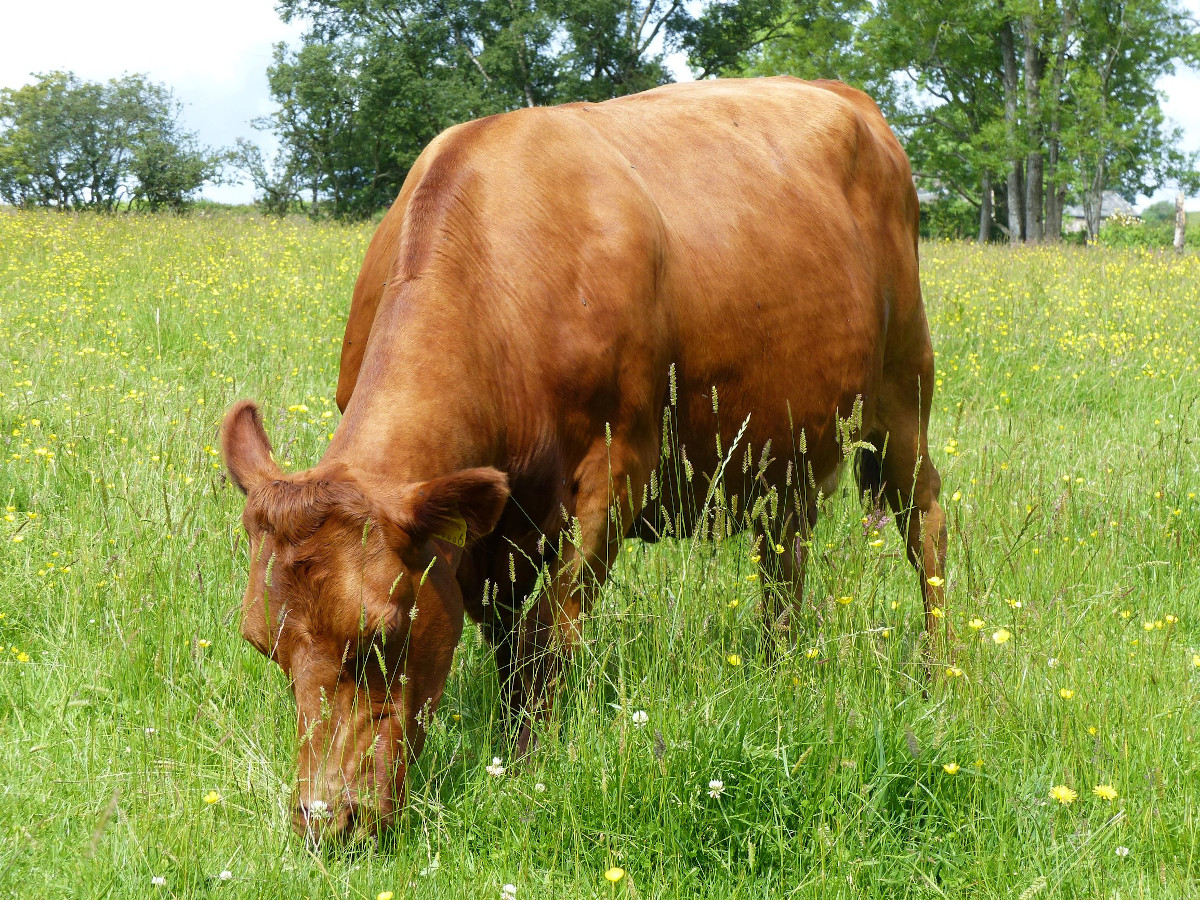Our Working Practices
We believe our animals should live a natural life with minimal stress. Their welfare is especially important to us. Our daily checks are part of their familiar routine, as are moves around the farm, often with the reward of fresh grazing.
 Dexter grazing on meadow flowers.
Dexter grazing on meadow flowers.
Our livestock roam in a safe natural environment with plenty of space and lots of shelter from the wind and rain as well as shade on the occasional sunny day!
The breeding bulls and stags mate their females naturally - we don’t use AI (artificial insemination) - and the females give birth and rear their young to a natural weaning age with little need for assistance. Veterinary treatments are administered only if required - fortunately, a rare occurrence – and we do not routinely administer antibiotics, wormers or growth promoters
Managing the Pasture
A lot of our time is spent managing our pastures to ensure there is plenty of quality food available year round. We don’t use additives in our silage, we don’t apply pesticides and we encourage clover to grow in our grass swards so we don't need to apply high levels of artificial fertiliser.
The stock graze our varied pastures during the summer and are fed silage and hay made on our farm during the winter rather than being more intensively reared on a cereal-based ration. This means that they grow more slowly and are a little older than more commercially reared meat animals when they’re ready for slaughter, this is just one of the reasons for our meat’s excellent flavour. Our pastures contain a range of grass species, which is good for livestock, as, like us, animals need a varied diet to keep them healthy. Deep-rooted herbs, wildflowers and even plants sometimes considered ‘weeds’ are an essential part of our pasture mixes, contributing essential minerals and trace elements.
Our Carbon Footprint
As well as minimising our farming inputs we aim to operate sustainably in our meat business too. Keeping the stored meat and the working environment in the butchery cool is essential in terms of meat hygiene and the meat’s keeping quality, inevitably this means we use a fair bit of electric. However almost half of this is generated on the farm from solar PV, and what is even better is that when we need the most power on bright sunny days those are the days when we’re producing most electric.
Vacum packing meat isn’t perhaps the most attractive of presentations, but it does enhance the meat’s keeping quality both in the chiller and freezer. Given a high proportion of the meat we sell will initially go into the home freezer we think its important that we package with that in mind. As yet there are no non-plastic options for vacuum packing, or for storing meat for more than a couple of days. So, for now, we must continue to use plastic packaging, but we do regularly research the market for alternatives. We no longer use none-recyclable trays for the sausage and burgers we sell at farmers markets and instead use a more expensive, but recyclable plastic tray, but we vacuum pack them when they are going direct to the consumer as part of any order unless our customers specifically ask for them in trays.
Our Principles
Deer & Dexter as a business is built on a desire
- To farm sustainably and minimise farming inputs
- To provide a stress-free environment for our livestock in which they can thrive
- To produce our meat with the smallest carbon footprint, minimising packaging and associated food miles the best we can within the constraints of operating to a high hygiene standard and providing a high-quality product.
We take our responsibility for our land and the wider environment seriously and are firm believers that how we look after it now will determine not only the future success of our business but also the health of our local environment for centuries to come.
